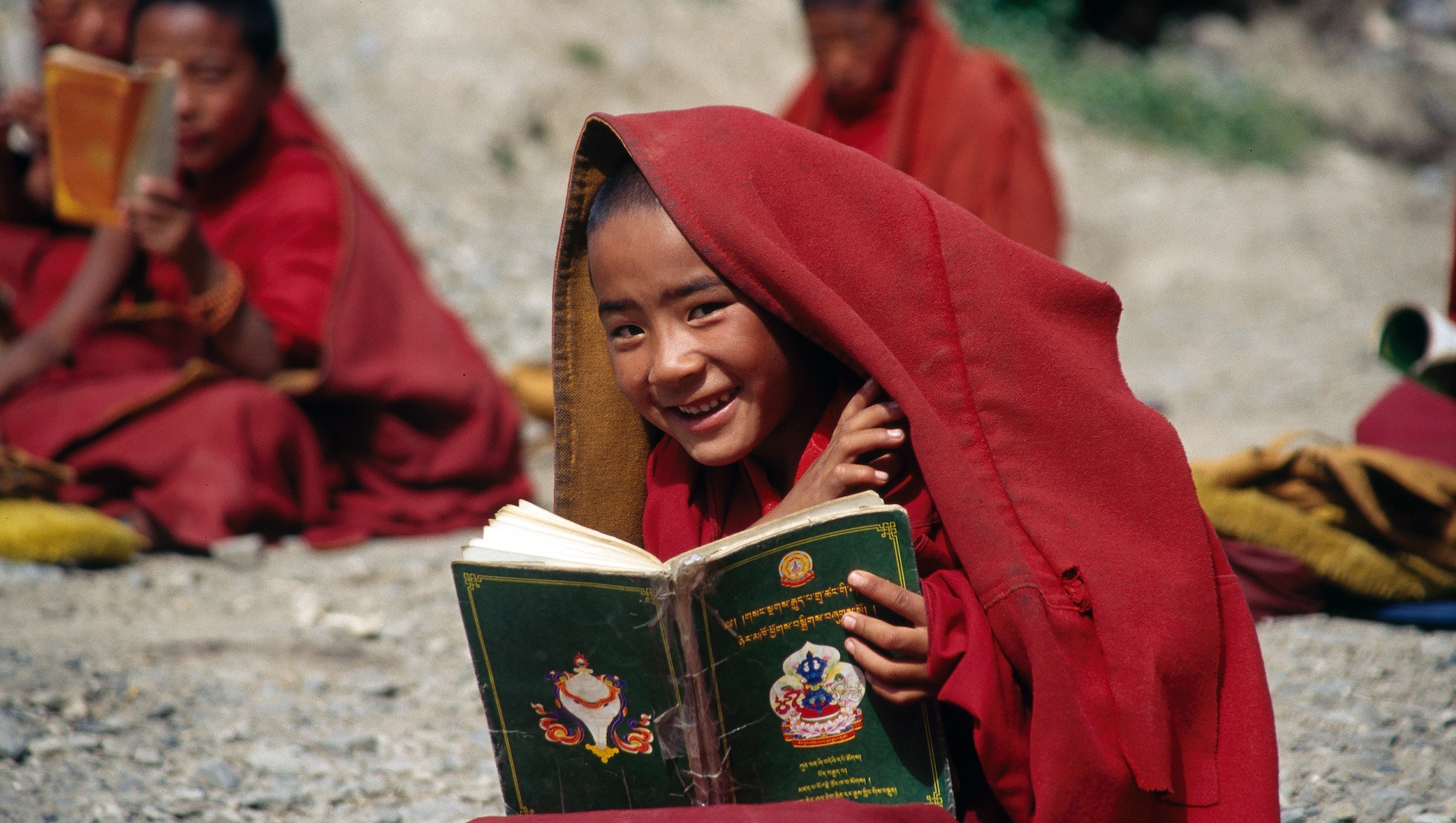
Editor’s Note: Not all of the books recommended below are works by Christian authors with a biblical worldview. However, stories told through artistic expression can help Christians understand tragic and real circumstances endured by men, women, and children made in God’s image.
“Yes, I would commit murder if I had to.”
This came from a soft-spoken Cambodian in my Russian literature class. We were discussing Dostoevsky’s Crime and Punishment. The rest of us had just denied we could kill, baffled that the protagonist, Raskolnikov, had robbed and ax-murdered an elderly woman to alleviate his poverty. Amazed, we listened to our classmate elaborate.
The Khmer Rouge had killed his parents. As eldest, he had to provide for his siblings. So he regularly snuck into a neighboring field to glean crops. “I was prepared,” he explained, “to kill the KR guard who patrolled the field, should I get caught. It would be his life or ours.”
I’d heard of Pol Pot’s atrocities, but what brought that history close to home was my classmate describing his life under the regime. These epic events had not happened to correspondingly epic characters, but to a peer—to one of us.
Creative writers delineate hard histories. Absorbed in story, we “experience” bedlam in ways news reports and textbooks can’t convey. Novels evoke a sense of what political and social upheaval mean to those who endure those hardships. Moreover, the authors leave us to write the rest of the story—our empathetic response to survivors resettled in our hometowns, stuck in refugee camps, or still dodging bombs back home.
And that response is important, crucial even, for those following Christ. Jesus sees the whole person. He grasps their situation and its significance. When we weep with those who weep, when we imagine their experience, we empathize. To that end, we’ve rounded up fifteen books to help bring people from across the globe and their histories closer to home.
Books for Adults
Say You are One of Them by Uwem Akpan
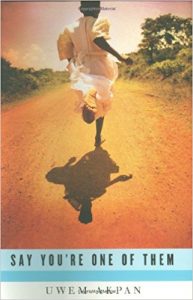 Akpan has a compelling African voice that relays fantastical horrors too much like the truth, so much so that his short story collection gave me a nightmare. He seeks to answer the question, “Doesn’t religion cause war?” by scratching off “Christian” or “Muslim” veneers to reveal tribal loyalties that override love itself. Without storytellers like Akpan, we cannot fathom the terrors of genocide or human trafficking. The vicarious experience this novel affords changes the way we see those who appeal to the West for help.
Akpan has a compelling African voice that relays fantastical horrors too much like the truth, so much so that his short story collection gave me a nightmare. He seeks to answer the question, “Doesn’t religion cause war?” by scratching off “Christian” or “Muslim” veneers to reveal tribal loyalties that override love itself. Without storytellers like Akpan, we cannot fathom the terrors of genocide or human trafficking. The vicarious experience this novel affords changes the way we see those who appeal to the West for help.
Safely Home by Randy Alcorn
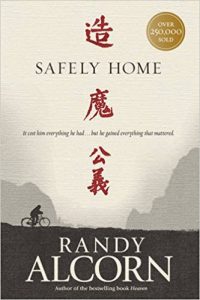 This highly readable book portrays what living for Jesus means in the face of opposition. The main character, Ben, wrestles with the faith of a coworker who won’t gloss over his convictions, despite his colleagues’ censure and company sanctions. Then a business trip leads Ben overseas to his old college roommate who proclaims the gospel even though it leads to shame, destitution, and prison. This novel evokes empathy for persecuted believers, as well as people like Ben who are struggling to get off the fence.
This highly readable book portrays what living for Jesus means in the face of opposition. The main character, Ben, wrestles with the faith of a coworker who won’t gloss over his convictions, despite his colleagues’ censure and company sanctions. Then a business trip leads Ben overseas to his old college roommate who proclaims the gospel even though it leads to shame, destitution, and prison. This novel evokes empathy for persecuted believers, as well as people like Ben who are struggling to get off the fence.
In the Time of the Butterflies by Julia Alvarez
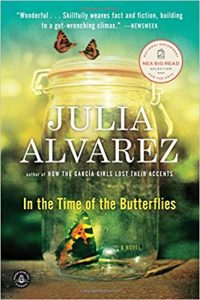 Alvarez offers a beautifully written, demythologized version of the Dominican Republic’s martyred Mirabal sisters: ordinary girls who resisted a tyrant. The story shows that greatness, which grows not from self-aggrandizement but from self-sacrifice—by juxtaposing the dictator with the sisters—is achievable by real people navigating surreal events. Most countries in Latin America, where I serve, lived under totalitarian governments at some point. This novel helps me understand this formative history of a people I desire to reach with the gospel, and it shows how their basis in other belief systems plays out in crises.
Alvarez offers a beautifully written, demythologized version of the Dominican Republic’s martyred Mirabal sisters: ordinary girls who resisted a tyrant. The story shows that greatness, which grows not from self-aggrandizement but from self-sacrifice—by juxtaposing the dictator with the sisters—is achievable by real people navigating surreal events. Most countries in Latin America, where I serve, lived under totalitarian governments at some point. This novel helps me understand this formative history of a people I desire to reach with the gospel, and it shows how their basis in other belief systems plays out in crises.
Moon in the Mist—Sleep Swimming by Shawn Boutwell
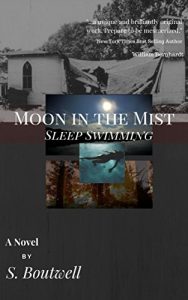 This intelligent novel packs a Civil Rights education inside a page-turning mystery. Boutwell writes from a Christ-centered worldview a book heavy with symbolism that challenges us to apply hard lessons from history. He awakens the reader to the personal nature of social responsibility and leaves him or her craving more of his engaging, thought-provoking prose.
This intelligent novel packs a Civil Rights education inside a page-turning mystery. Boutwell writes from a Christ-centered worldview a book heavy with symbolism that challenges us to apply hard lessons from history. He awakens the reader to the personal nature of social responsibility and leaves him or her craving more of his engaging, thought-provoking prose.
Little Bee by Chris Cleave
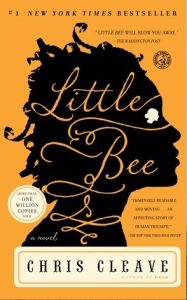 Cleave walks us through painful consequences of greed that span two distinct worlds, experienced through the perspectives of a Nigerian asylum seeker and a prestigious editor in Britain. Socially irresponsible corporations, thugs, victims of crime, and an immigration detention system that keeps traumatized refugees in limbo create a story that compels us to minister to those living out the effects of sin—others’ or their own—and to advocate for the powerless stranger, even when it hurts.
Cleave walks us through painful consequences of greed that span two distinct worlds, experienced through the perspectives of a Nigerian asylum seeker and a prestigious editor in Britain. Socially irresponsible corporations, thugs, victims of crime, and an immigration detention system that keeps traumatized refugees in limbo create a story that compels us to minister to those living out the effects of sin—others’ or their own—and to advocate for the powerless stranger, even when it hurts.
Krik? Krak! by Edwidge Danticat
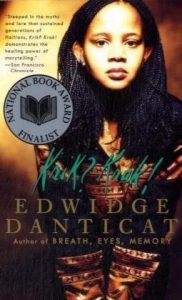 This short-story collection gives a voice to Haitians affected by the Duvalier regime. Danticat, a Haitian-American, expresses the layered identity of many majority world cultures: I am myself and I am also the ancestors whose blood courses through me. Reading Danticat, we begin to understand her people. Haiti receives the most aid of any country in the Western Hemisphere. Christians who want to help in a way that is sustainable, and who want to avoid objectifying those of lesser economic means, should learn about Haitian history, culture, and worldview.
This short-story collection gives a voice to Haitians affected by the Duvalier regime. Danticat, a Haitian-American, expresses the layered identity of many majority world cultures: I am myself and I am also the ancestors whose blood courses through me. Reading Danticat, we begin to understand her people. Haiti receives the most aid of any country in the Western Hemisphere. Christians who want to help in a way that is sustainable, and who want to avoid objectifying those of lesser economic means, should learn about Haitian history, culture, and worldview.
Water from my Heart by Charles Martin
 This novel exposes unethical business tactics compounding natural disaster, but it also portrays the tenacity of majority world communities. Martin’s tale reminds us that there is a road to redemption, a choice to make about walking that road, and enough love to move us on our way. This novel shows how much we have to learn from people we often unknowingly consider to be objects of our charity or social justice campaigns. It helps to balance our perspective and promote cross-cultural partnership instead of the equally damaging extremes of either exploitation or paternalism.
This novel exposes unethical business tactics compounding natural disaster, but it also portrays the tenacity of majority world communities. Martin’s tale reminds us that there is a road to redemption, a choice to make about walking that road, and enough love to move us on our way. This novel shows how much we have to learn from people we often unknowingly consider to be objects of our charity or social justice campaigns. It helps to balance our perspective and promote cross-cultural partnership instead of the equally damaging extremes of either exploitation or paternalism.
Bonhoeffer: Pastor, Martyr, Prophet, Spy by Eric Metaxas
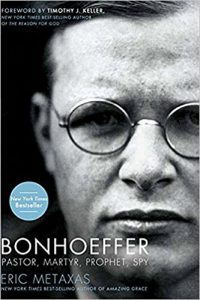 Bonhoeffer left the haven of academia in the United States to work against the Nazis from within Germany. His words and actions leave us wanting more of the Christ who inspired him to fight evil and injustice in his time. Other unjust leaders have risen to power in our generation, oppressing minorities and even corrupting the church. Bonhoeffer’s story helps us fathom the duress Christians under such regimes endure and rethink what it means to count the cost of discipleship.
Bonhoeffer left the haven of academia in the United States to work against the Nazis from within Germany. His words and actions leave us wanting more of the Christ who inspired him to fight evil and injustice in his time. Other unjust leaders have risen to power in our generation, oppressing minorities and even corrupting the church. Bonhoeffer’s story helps us fathom the duress Christians under such regimes endure and rethink what it means to count the cost of discipleship.
A Gentleman in Moscow by Amor Towles
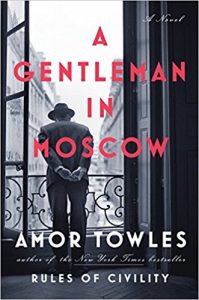 House arrest. For decades, this term was synonymous with Aung San Suu Kyi and other political dissidents. Towles invented a similar scenario for a character who lands on the losing side of the Bolshevik Revolution. Towles purports that the confined life still impacts others. Despite limitations, imposed or elected, we can shape the world through our relationships. This novel grabbed my attention because seventeen years into a missions career, my idealism bumped up against reality—I am not changing the world on a grand scale. Through Towles book, the Lord reminds me that even though my part is small, it matters because one life can impact another, one relationship at a time.
House arrest. For decades, this term was synonymous with Aung San Suu Kyi and other political dissidents. Towles invented a similar scenario for a character who lands on the losing side of the Bolshevik Revolution. Towles purports that the confined life still impacts others. Despite limitations, imposed or elected, we can shape the world through our relationships. This novel grabbed my attention because seventeen years into a missions career, my idealism bumped up against reality—I am not changing the world on a grand scale. Through Towles book, the Lord reminds me that even though my part is small, it matters because one life can impact another, one relationship at a time.
Books for Young Adults
I Lived on Butterfly Hill by Marjorie Agosin
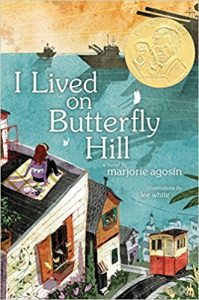 Through the first-person narrative of a young girl, we experience the effects of a coup and a fascist dictatorship. People who support the toppled leaders’ values (including the main character’s parents) have disappeared or are forced into hiding. Agosin depicts the trauma that threatened and displaced people suffer, as well as the way people whose belief systems are undergirded by animism cope in a crisis. This worldview insight is crucial for those trying to communicate the gospel to people of syncretistic faiths.
Through the first-person narrative of a young girl, we experience the effects of a coup and a fascist dictatorship. People who support the toppled leaders’ values (including the main character’s parents) have disappeared or are forced into hiding. Agosin depicts the trauma that threatened and displaced people suffer, as well as the way people whose belief systems are undergirded by animism cope in a crisis. This worldview insight is crucial for those trying to communicate the gospel to people of syncretistic faiths.
Refugee by Alan Gratz
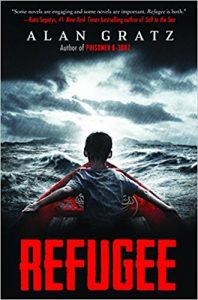 I cannot hear about the Syrian refugee crisis without picturing three-year-old Alan Kurdi face down on a Mediterranean beach. Why do families take such risks? Gratz offers an answer by depicting ordinary people striving to live in extraordinary circumstances, from Jewish refugees of WWII to Cuban refugees in the mid-nineties. There are and will be more refugees in our time. Gratz’s stories of the refugee plight inspire compassion that should lead us to pray for, to serve, and to advocate for these victims of circumstance.
I cannot hear about the Syrian refugee crisis without picturing three-year-old Alan Kurdi face down on a Mediterranean beach. Why do families take such risks? Gratz offers an answer by depicting ordinary people striving to live in extraordinary circumstances, from Jewish refugees of WWII to Cuban refugees in the mid-nineties. There are and will be more refugees in our time. Gratz’s stories of the refugee plight inspire compassion that should lead us to pray for, to serve, and to advocate for these victims of circumstance.
One Half from the East by Nadia Hashimi
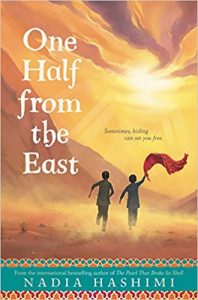 This novel shows what most of the world knows to be true—that poverty is but one disaster away. Hashimi helps readers feel the stress of poverty and the fear that comes from living in the same town as a warlord, and helps them understand how families risk much to secure their future. The modern-day culture of Afghanistan she depicts is one where the individual serves the group, no matter the sacrifice. Having heard so much about Afghanistan in the news, I was glad to discover a novel that helps me understand a people so far away from me, yet so close to the heart of God.
This novel shows what most of the world knows to be true—that poverty is but one disaster away. Hashimi helps readers feel the stress of poverty and the fear that comes from living in the same town as a warlord, and helps them understand how families risk much to secure their future. The modern-day culture of Afghanistan she depicts is one where the individual serves the group, no matter the sacrifice. Having heard so much about Afghanistan in the news, I was glad to discover a novel that helps me understand a people so far away from me, yet so close to the heart of God.
Books for Children
My Beautiful Birds by Suzanne Del Rizzo (ages 6+)
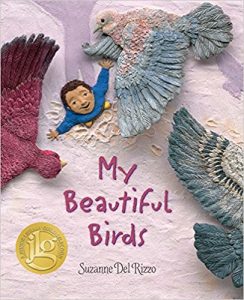 With detailed clay sculptures and poignant insight, Del Rizzo presents a child’s refugee experience. She focuses on loss and hope in a concrete way that children can relate to through the main character’s worrying about and missing the pet birds left behind when his family is forced to flee. This book is not only good for our children. It’s good for us to see what refugee children experience and to let this perspective resonate with biblical teaching on how to treat the alien, the stranger, the suffering.
With detailed clay sculptures and poignant insight, Del Rizzo presents a child’s refugee experience. She focuses on loss and hope in a concrete way that children can relate to through the main character’s worrying about and missing the pet birds left behind when his family is forced to flee. This book is not only good for our children. It’s good for us to see what refugee children experience and to let this perspective resonate with biblical teaching on how to treat the alien, the stranger, the suffering.
Stepping Stones: A Refugee Family’s Journey by Margaret Ruurs (ages 6+)
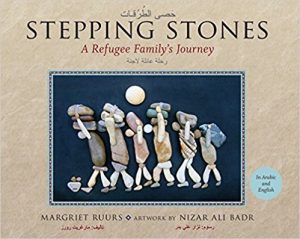 Through the evocative arrangement of stones in tableaux, a Syrian artist describes the refugee journey—how choosing life means leaving home, traversing a long road ahead, facing the dangerous sea, sustaining hope, and enduring in love. So much of what we read in English about majority world people’s experience is filtered through Western writers. This work is unique because though Ruurs is Canadian, the story that inspired her work is told by a Syrian through his art.
Through the evocative arrangement of stones in tableaux, a Syrian artist describes the refugee journey—how choosing life means leaving home, traversing a long road ahead, facing the dangerous sea, sustaining hope, and enduring in love. So much of what we read in English about majority world people’s experience is filtered through Western writers. This work is unique because though Ruurs is Canadian, the story that inspired her work is told by a Syrian through his art.
Blinded by the Shining Path by Dave and Neta Jackson (ages 10+)
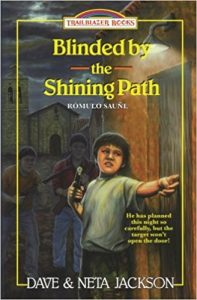 Shining Path terrorists battled the Peruvian government from 1980 to 2000. Their “join us or die” recruitment method sent thousands fleeing from mountain villages. Dave and Neta Jackson set their novel in this turbulent context. Though fictitious, the story echoes reports from that time and can introduce children to world events over which God remains sovereign.
Shining Path terrorists battled the Peruvian government from 1980 to 2000. Their “join us or die” recruitment method sent thousands fleeing from mountain villages. Dave and Neta Jackson set their novel in this turbulent context. Though fictitious, the story echoes reports from that time and can introduce children to world events over which God remains sovereign.
Jennifer Waldrep is an IMB missionary in Lima, Peru.

